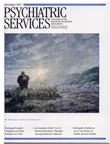NMS and HIV
To the Editor: In their excellent review of neuroleptic malignant syndrome (NMS) published in the September 1998 issue, Pelonero and associates (1) called attention to the role of poorly controlled or treatment-resistant extrapyramidal symptoms as risk factors for NMS. We would like to amplify this point and call attention to the association between HIV infection and increased sensitivity to extrapyramidal symptoms. Several authors have reported on cases of NMS in patients with AIDS, leading us to wonder whether advanced HIV infection may be a risk factor for NMS.
Breitbart and associates (2) reported three cases of NMS in patients with AIDS dementia who were treated with neuroleptics. Rosebush and Stewart (3) reported on 24 cases of NMS occurring in 20 patients, one of whom was a 31-year-old man with AIDS. Swenson and associates (4) reported a case of AIDS and dementia in a man who developed severe extrapyramidal symptoms with many features of NMS while being treated with a phenothiazine, prochlorperazine, as an antiemetic. Vogel-Scibilia and colleagues (5) identified an episode of NMS in a literature review of 13 cases of HIV infection presenting as psychosis, of whom seven were treated with neuroleptics.
These case reports call attention to the possible role of HIV infection as a risk factor for NMS. Several of these authors observe that HIV infection of the central nervous system may increase a patient's susceptibility to extrapyramidal symptoms. If increased sensitivity to extrapyramidal symptoms is a risk factor for NMS, as Pelonero and associates suggest, then it follows that HIV infection may predispose to NMS.
Of note, five of the six cases of NMS reported by the authors cited above occurred in patients with AIDS, and most involved the use of standard, as opposed to atypical, antipsychotics. Some authors have suggested that the increased sensitivity to extrapyramidal symptoms may be a direct effect of HIV on the basal ganglia. At the very least, clinical caution is indicated when using standard antipsychotics in the treatment of patients with advanced HIV infection or AIDS.
Dr. Horwath is associate clinical professor of psychiatry and Dr. Cournos is professor of clinical psychiatry at Columbia University College of Physicians and Surgeons in New York City.
1. Pelonero AL, Levenson JL, Pandurangi AK: Neuroleptic malignant syndrome: a review. Psychiatric Services 49:1163-1172, 1998Link, Google Scholar
2. Breitbart W, Marotta RF, Call P: AIDS and neuroleptic malignant syndrome (ltr). Lancet 2:1488-1489, 1988Crossref, Medline, Google Scholar
3. Rosebush P, Stewart T: A prospective analysis of 24 episodes of neuroleptic malignant syndrome. American Journal of Psychiatry 146:717-725, 1989Link, Google Scholar
4. Swenson JR, Erman M, Labelle J, et al: Extrapyramidal reactions: neuropsychiatric mimics in patients with AIDS. General Hospital Psychiatry 11:248-253, 1989Crossref, Medline, Google Scholar
5. Vogel-Scibilia SE, Mulsant BH, Keshavan MS: HIV infection presenting as psychosis: a critique. Acta Psychiatrica Scandinavica 78:652-656, 1988Crossref, Medline, Google Scholar



